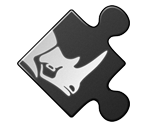Endpoint Conventions
Unless noted, the following conventions apply to all endpoints available to registered issuers in Cloud Zoo.
Endpoint Location
The base URL for all requests is https://cloudzoo.rhino3d.com/v1.
JSON
All payload to and from endpoints happens in JSON format. To make this explicit, every response to an endpoint will have the header Content-Type: application/json present in the HTTPS response.
Authentication
All endpoints in Cloud Zoo or on the issuer use Basic Authentication. To receive a successful response from an endpoint, you must include an Authorization header like so:
Authorization: Basic BASE64ENCODEDSTRING
where BASE64ENCODEDSTRING is a base64 encoded string containing your issuer id and your issuer secret:
BASE64ENCODEDSTRING = b64.encode(issuer_id + ":" + issuer_secret)
Non-successful responses
All unsuccessful responses from endpoints will have an HTTP status code greater or equal to 400. If the status code is also less than 500, the payload will include the following JSON:
{
"Error": "SomeErrorCode"
"Description": "A description about the error message",
"Details": "More details about the error"
}
- The
Errorfield contains a specific error code that can be used by the issuer to recognize a specific error, such as incorrect credentials. - The
Descriptionfield contains a description of the error. - The
Detailsfield contains details of the error, possibly suggesting how to fix it.
If the status code is greater or equal to 500, the response may not be in JSON format and may be empty.
Endpoints
DELETE /license
Removes a license from Cloud Zoo. This method deletes the entire License Cluster object the license is in. If the License Cluster the license belongs to contains additional licenses, they will be removed as well.
Example Request
DELETE /license?licenseId=LICENSE_ID&productId=PRODUCT_ID&entityId=ENTITY_ID
entityId: The id of the entity the license belongs to.productId: The id of the product the license represents. This is a GUID.licenseId: The license id that identifies a unique license within the product id domain.
Response
A successful response (The license was removed):
- HTTP Status Code:
200 (OK) - Response Payload: Empty.
A non-successful (error) response (The license cannot be removed):
- HTTP Status Code: A code greater or equal to
400 (Bad Request) - Response Payload: A non-successful response
PUT /license
Adds or replaces a License Cluster in Cloud Zoo. If any of the licenses in the License Cluster object passed already exist in the given entity, their license cluster will be overwritten with the License Cluster passed. If there is more than one cluster in the entity containing the licenses in the cluster passed, an error will be returned and the operation will be aborted.
Example Request
PUT /license
{
"entityId": "9034901491490-|-Group",
"licenseCluster": LICENSE_CLUSTER_OBJECT
}
The entityId should be the entity where the License Cluster will be added or updated.
The licenseCluster should be a License Cluster object representing the license(s) to be added or updated.
Response
A successful response (The license was removed):
- HTTP Status Code:
200 (OK) - Response Payload: Empty.
A non-successful (error) response (The license cannot be added/updated):
- HTTP Status Code: A code greater or equal to
400 (Bad Request) - Response Payload: A non-successful response

